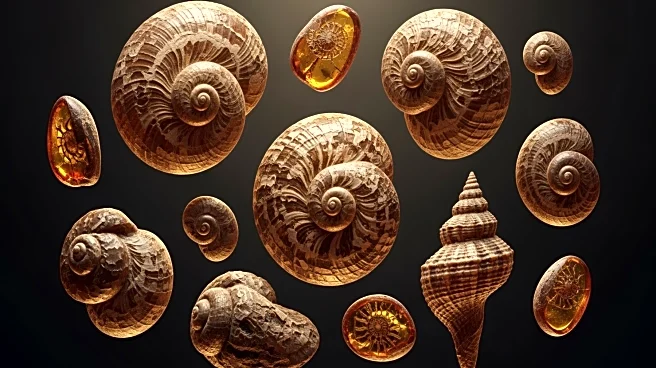What's Happening?
Paleontologists Karma Nanglu and Danielle de Carle have made significant discoveries regarding ancient parasites, as discussed in a recent episode of NPR's Short Wave. The episode highlights the rarity
of finding parasite fossils due to their soft tissue composition, which does not preserve well in rock. Among the notable findings is a mysterious fossil referred to as the 'Riddler' and the oldest-known leech fossil, dating back over 500 million years. These discoveries provide insights into the long history of parasitism on Earth, predating even the dinosaurs. The episode explores the power and evolution of parasitism, suggesting that many prehistoric mysteries may still be hidden in unexplored locations.
Why It's Important?
The discovery of ancient parasite fossils is crucial for understanding the evolutionary history of parasitism, a relationship that has significantly impacted ecosystems and species development over millions of years. By studying these fossils, scientists can gain insights into how parasites have adapted and evolved alongside their hosts, influencing biodiversity and ecological dynamics. This research could also have implications for modern science, potentially informing studies on current parasitic relationships and their effects on human health and agriculture. The findings underscore the importance of paleontology in uncovering the hidden stories of Earth's biological past, which can inform present and future scientific endeavors.
What's Next?
Further exploration and excavation of potential fossil sites could lead to more discoveries, enhancing our understanding of ancient parasitic relationships. Paleontologists may continue to investigate unexplored areas, such as basements and other storage locations, where undiscovered fossils might reside. Additionally, advancements in technology and research methods could improve the ability to identify and analyze soft tissue fossils, providing more detailed insights into the evolution of parasitism. The scientific community may also engage in interdisciplinary collaborations to explore the broader implications of these findings on current ecological and health-related issues.
Beyond the Headlines
The study of ancient parasites not only enriches our understanding of evolutionary biology but also raises ethical and philosophical questions about the nature of parasitism and its role in the natural world. The concept of parasitism challenges traditional views of survival and adaptation, highlighting the complex interdependencies that exist within ecosystems. These discoveries may prompt discussions on the ethical considerations of studying and manipulating parasitic relationships, particularly in the context of biotechnology and genetic research. The long-term impact of these findings could influence conservation strategies and policies aimed at preserving biodiversity and ecological balance.









